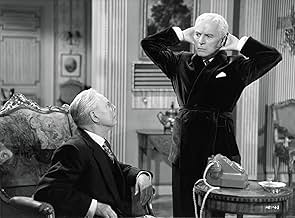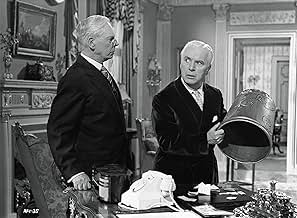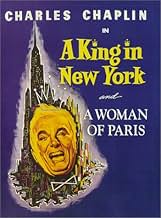IMDb RATING
7.0/10
9.5K
YOUR RATING
A recently-deposed European monarch seeks shelter in New York City, where he becomes an accidental television celebrity and is later wrongly accused of being a Communist.A recently-deposed European monarch seeks shelter in New York City, where he becomes an accidental television celebrity and is later wrongly accused of being a Communist.A recently-deposed European monarch seeks shelter in New York City, where he becomes an accidental television celebrity and is later wrongly accused of being a Communist.
- Awards
- 1 win & 1 nomination total
- Director
- Writer
- All cast & crew
- Production, box office & more at IMDbPro
Featured reviews
... while he himself was basically exiled in a strange land. 1957's "A King in New York" shows Chaplin at the end of his film career. In fact, it is the last film in which Chaplin himself stars. Refused permission to reenter the U.S. in 1952 due to the idea that he held anti-American beliefs, he actually made this film about a deposed European king in New York in England. The film suffers from production values that are not as high as they were in Chaplin's earlier films, and if you have the version Warner Brothers put out in 2004, the commentary points out that Chaplin had much trouble making this film mainly because he was not dealing with familiar personnel in his own studio as he had in his earlier efforts. The film's political statements are heavy-handed, but there are still some good comic turns by Chaplin and his viewpoints and comic bits on America and rampant commercialism and consumerism still hold up today. In fact, they are probably much more relevant today than they were when this movie was first made.
If you are curious about Chaplin's work you need to eventually view this film, just don't start your journey here. If you are just starting out, I recommend you view Chaplin's Mutual Comedies. These are 12 two-reel comedies Chaplin made in 1916 and 1917 and show his comic technique evolve from the pants-kicking fests of his Essanay and Keystone films into the sophisticated technique he had from the end of the series onward. Also, the Mutual period was named by Chaplin himself as the era in both his personal and professional life in which he was the happiest.
If you are curious about Chaplin's work you need to eventually view this film, just don't start your journey here. If you are just starting out, I recommend you view Chaplin's Mutual Comedies. These are 12 two-reel comedies Chaplin made in 1916 and 1917 and show his comic technique evolve from the pants-kicking fests of his Essanay and Keystone films into the sophisticated technique he had from the end of the series onward. Also, the Mutual period was named by Chaplin himself as the era in both his personal and professional life in which he was the happiest.
Someone once described "A King in New York" as the worst film ever made by a major artist. I can think of many worse examples and while this late Chaplin picture may lack the genius of his earlier work, (it was his penultimate film; he made it several years after "Limelight" and before "A Countess from Hong Kong"), it is an often very funny satire on what Chaplin perceived as 'the modern age'. Driven out of America by McCarthyism, Chaplin constructed his New York in a British studio and typical of its writer, director, star and composer it makes no apology for its attack on right-wing politics, in particular the HUAC, as well as television, Cinemascope and plastic surgery. It's also less sentimental than it might have been, (always Chaplin's biggest fault), but the plot involving a child played by Chaplin's own son Michael, does the film no favours. On the other hand, Chaplin himself is superb and Dawn Adams is surprisingly good as a television star. No masterpiece, then but not quite the disaster some people have said of it either.
Now, I've yet to see A COUNTESS FROM HONG KONG, but out of Chaplin's full-length talkies, I didn't find A KING IN NEW YORK terrible by any stretch. In fact-- and I might lose cinephile points for admitting it-- I'd take this over the more prestigious LIMELIGHT any day! It's less self-indulgent and self-loving, and the satire of American media culture still mostly works.
Why does this get so much hate? Maybe it's the film's roughness. It's clearly set-bound and those sets do look cheap most of the time. But money can't buy inspiration, and I think this movie has more than enough inspiration to make up for its lesser production values. Many of the vignettes are delightful and the bittersweet edges (the subplot with Shadov's estranged queen, the character arc of the philosophical young boy) lend this film a great deal of memorability.
Why does this get so much hate? Maybe it's the film's roughness. It's clearly set-bound and those sets do look cheap most of the time. But money can't buy inspiration, and I think this movie has more than enough inspiration to make up for its lesser production values. Many of the vignettes are delightful and the bittersweet edges (the subplot with Shadov's estranged queen, the character arc of the philosophical young boy) lend this film a great deal of memorability.
10Chuck-78
"A King in New York" is one of those few films that gets better and better every time you see it.
Yes, it's flawed--the sets look shabby, and some of the dialogue is stilted and melodramatic. Yet despite these shortcomings, AKINY still stands out as a wonderful, playful satire of 1950's America.
For those of you who may not know, Chaplin himself was targetted by the U.S. government at the time for his alleged communist leanings. In fact, AKINY had to be shot in Britain (Chaplin's birthplace) only because Chaplin and his family had been forbidden to re-enter the U.S after a short vacation overseas.
AKINY was Chaplin's response to the nonsense and paranoia that pervaded American society at that time. Chaplin also pokes fun at America's obsession with technology and the media--a point which is even more relevant today.
Chaplin plays King Shahdov, a deposed monarch who flees to America in the hopes of selling his plans for a peaceful, nuclear-based society (which never happens). Chaplin plays Shahdov as an honest, but hapless European monarch thrust into the dizzying whirl of modern America. Chaplin is at his absolute best here as a befuddled and somewhat puzzled outsider.
Shahdov soon meets up with two people. The first is Ann Kay (Dawn Addams), a beautiful young woman who seduces the King and lures him into appearing in her television commercials, and Rupert Macabee (played by Chaplin's son, Michael), a brilliant young boy whose parents have been imprisoned by HUAC. Also worth noting is Ambassador Jaume (Oliver Johnston), Shahdov's loyal friend and confidante. Johnston and Chaplin play off each other beautifully, and together they share some of the film's funniest moments.
AKINY is full of priceless "bits of business," as Chaplin used to say--there's a hilarious restaurant scene in which Chaplin mimes his order to the waiter in order to overcome the dreadful racket from the house band.
Then there's the scene in which Shahdov's newly lifted face become "unhinged" as he bursts into laughter at a comedy show. Chaplin slyly slips in and out of these bits (which are essentially silent comedy pantomimes dating back to his earliest days in English Music Halls) with great ease.
Such scenes provide the most satisfying moments in the film. Here, behind Chaplin's aged face and body, you can still see the little tramp come to life, and it's wonderful.
AKINY is vastly underrated by most critics who, for some reason, obsess over the sets, and virtually ignore what is truly one of Chaplin's masterpieces. AKINY is rarely screened in North America for some reason, so if you get the chance to see it, don't pass it up.
Yes, it's flawed--the sets look shabby, and some of the dialogue is stilted and melodramatic. Yet despite these shortcomings, AKINY still stands out as a wonderful, playful satire of 1950's America.
For those of you who may not know, Chaplin himself was targetted by the U.S. government at the time for his alleged communist leanings. In fact, AKINY had to be shot in Britain (Chaplin's birthplace) only because Chaplin and his family had been forbidden to re-enter the U.S after a short vacation overseas.
AKINY was Chaplin's response to the nonsense and paranoia that pervaded American society at that time. Chaplin also pokes fun at America's obsession with technology and the media--a point which is even more relevant today.
Chaplin plays King Shahdov, a deposed monarch who flees to America in the hopes of selling his plans for a peaceful, nuclear-based society (which never happens). Chaplin plays Shahdov as an honest, but hapless European monarch thrust into the dizzying whirl of modern America. Chaplin is at his absolute best here as a befuddled and somewhat puzzled outsider.
Shahdov soon meets up with two people. The first is Ann Kay (Dawn Addams), a beautiful young woman who seduces the King and lures him into appearing in her television commercials, and Rupert Macabee (played by Chaplin's son, Michael), a brilliant young boy whose parents have been imprisoned by HUAC. Also worth noting is Ambassador Jaume (Oliver Johnston), Shahdov's loyal friend and confidante. Johnston and Chaplin play off each other beautifully, and together they share some of the film's funniest moments.
AKINY is full of priceless "bits of business," as Chaplin used to say--there's a hilarious restaurant scene in which Chaplin mimes his order to the waiter in order to overcome the dreadful racket from the house band.
Then there's the scene in which Shahdov's newly lifted face become "unhinged" as he bursts into laughter at a comedy show. Chaplin slyly slips in and out of these bits (which are essentially silent comedy pantomimes dating back to his earliest days in English Music Halls) with great ease.
Such scenes provide the most satisfying moments in the film. Here, behind Chaplin's aged face and body, you can still see the little tramp come to life, and it's wonderful.
AKINY is vastly underrated by most critics who, for some reason, obsess over the sets, and virtually ignore what is truly one of Chaplin's masterpieces. AKINY is rarely screened in North America for some reason, so if you get the chance to see it, don't pass it up.
When I rented this movie, I had no idae what to expect. Charlie Chaplin in a talkie?! I had just seen (heard?) how poor Buster Keaton's awful voice destroyed his presence as the classic stone-faced pantomine. Might Mr. Chaplin's performance in a speaking role be as sadly disappointing???
The answer in a resounding word was, "NO!" If anything, Chaplin's voice and accompanying ability to express himself with words enhanced his screen presence by providing a new dimension with which to appreciate his seemingly limitless talent.
I'm not sure just how to explain this other than the fact that I watched most of the film with a big grin glued to my face. I marvelled at the subtleties of Chaplin's performance which distinguish him not only as a silent movie actor, but as an actor of ANY era! In today's world of over-the-top silliness and questionable acting passing as good comedy, his performance is a clear indication that intelligent comedy is not an oxymoron and that the "King" of it is the same person as the king of slapstick.
If you're the kind of person who appreciates the subtlety in Woody Allen's humor, you will find yourself marvelling at "A King in New York" and you will see (and hear!) a part of Charlie Chaplin you may not ever have known existed.
The answer in a resounding word was, "NO!" If anything, Chaplin's voice and accompanying ability to express himself with words enhanced his screen presence by providing a new dimension with which to appreciate his seemingly limitless talent.
I'm not sure just how to explain this other than the fact that I watched most of the film with a big grin glued to my face. I marvelled at the subtleties of Chaplin's performance which distinguish him not only as a silent movie actor, but as an actor of ANY era! In today's world of over-the-top silliness and questionable acting passing as good comedy, his performance is a clear indication that intelligent comedy is not an oxymoron and that the "King" of it is the same person as the king of slapstick.
If you're the kind of person who appreciates the subtlety in Woody Allen's humor, you will find yourself marvelling at "A King in New York" and you will see (and hear!) a part of Charlie Chaplin you may not ever have known existed.
Did you know
- TriviaThe first film that Sir Charles Chaplin made in the UK after his exile from America, and his last leading role in a movie.
- GoofsDuring his diatribe, Rupert claims that the Roman Empire fell with the assassination of Caesar. Caesar's assassination occurred 17 years before the Roman Empire was established.
- Quotes
[after being told that the political turmoil in America is just a "passing phase."]
King Shahdov: Quite so. In the meantime, I'll sit it out in Europe.
- Alternate versionsOriginal British prints run about five minutes longer than the version that was released in America in 1976. It is this American version that is available on video, but the British cut is available on disc.
- ConnectionsEdited into Histoire(s) du cinéma: Fatale beauté (1994)
- How long is A King in New York?Powered by Alexa
Details
- Release date
- Countries of origin
- Official sites
- Language
- Also known as
- Un rey en Nueva York
- Filming locations
- Production company
- See more company credits at IMDbPro
Box office
- Gross worldwide
- $910
- Runtime1 hour 50 minutes
- Color
Contribute to this page
Suggest an edit or add missing content




































